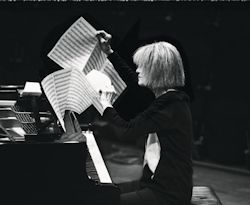Andando el Tiempo:
Sin Fin
Potación de Guaya
Camino al Volver
Saints Alive!
Naked Bridges/Diving Brides
It's difficult to believe that Carla Bley is 80, not least because if you check reference sources there seems to be some dispute about whether she was born
in 1936 or 1938 (the revered New Grove Dictionary of Jazz, Second Edition, opted for the latter, for instance, and the BBC Music website manages to get
both years on the same page!). However, ECM reliably inform us that her 80th birthday took place on the 11th of May this year and
that this new trio album celebrates the occasion as well as reminding us of the continuing relevance of one of the true originals of jazz music. This
California-born composer, pianist and organist was initially seen as part of the avant-garde but her music has drawn on a wide range of influences over the
years including bebop, jazz-rock and free jazz as well as classical music. It has been conspicuous, too, for a certain quirky humour reflected in titles
and tunes (her album of Christmas Carols for the Watt label recorded in 2008 contained, amidst soothing traditional favourites, her own rousing Hell's Bells). She has recorded with groups large and small including the Liberation Music Orchestra where her arranging talents were to the fore.
Here she is with her long-established trio which features the British saxophonist Andy Sheppard and someone who is more than a musical companion but also
her life partner, bass guitarist Steve Swallow.
The title of the disc overall refers, in addition, to a three part suite of the same name which traces stages of recovery from addiction. Bley tells us in
the liner notes that it was triggered by witnessing a friend passing through this, at times painful, process, subsequently emerging to a better place in
their life. Sin Fin is to do with facing a crisis point. There is a reflective piano introduction before Bley is joined by Andy Sheppard's smoky
and distinctive tenor. There is poignant interplay between the two before Steve Swallow gently and effectively insinuates himself into the dialogue. Bley
plays with her customary intelligence throughout in what is a fine piece. Potación de Guaya suggests the grief suffered by those
affected, directly or indirectly, by addiction and its consequences. This track is sensitive and exploratory, Carla Bley deliberate and pensive, Sheppard,
on soprano, easy on the ear and Steve Swallow again demonstrating why he is regarded as one of the best musicians on his instrument anywhere. Deeply
satisfying. The final part of the suite, Camino al Volver has to do with the task of returning to what Bley calls 'a healthy and sustainable
life'. Swallow lays down the beat, interacting first with Bley then with Andy Sheppard. The repetitive theme continues to build. There is some fascinating
improvisation from Swallow in particular before Sheppard returns on tenor, pressing ahead with urgency, the theme resurfacing near the end.
The suite completed, there remain two further tracks. Saints Alive! summons up, according to Bley, a picture of old ladies gossiping on the front
porch in the cool of the evening. The expression is one they might use for some particularly salacious titbit. There's an opening reminiscent of the
ticking of a clock, marking the passing of time, from Carla Bley. Swallow is always inventive as he surfs along over Bley's metronomic, almost trance-like
playing. At last, after five minutes of this eight and a half minute piece, Andy Sheppard's dulcet tones make an entrance, to impressive effect. The final
track, Naked Bridges/Diving Brides gets its intriguing title from a poem by Paul Haines and was commissioned by Serious for the EFG London Jazz
Festival 21st birthday. Carla Bley wrote it, as she puts it, 'with a little help from Felix Mendelssohn' as a wedding present for newly-weds
Andy and Sara Sheppard. It features cascading piano notes, subterranean bass guitar from the great Steve Swallow, and Sheppard eloquent on soprano sax.
Bley's humour surfaces during her piano solo, when more than a snatch of Mendelsohn's Wedding March can be heard.
I've written something here about each track because of the quality of composition and performance that can be found at every point. Chamber jazz, maybe,
but accessible and consistently engaging. The passing years have not diminished Carla Bley's appetite for creating new music that appeals to concert
audiences, reviewers and purchasers of CDs alike.
James Poore
